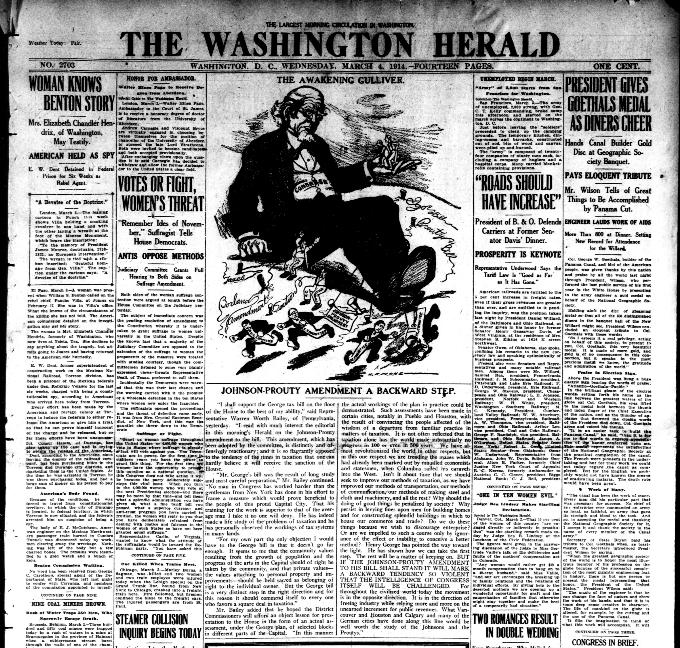|
Moderated by NW Okie! |
Volume 16 , Issue 92014Weekly eZine: (374 subscribers)Subscribe | Unsubscribe Using Desktop... |
1914 - Votes Or Fight, Women's Threat

On 4 March 1914, Wednesday in a news article that appeared in The Washington Herald, Washington, DC, there were headlines, Votes Or Fight, Women's Threat, which the suffragist was telling the House Democrats: 'Remember Ides of November.' Also Antis opposed methods. And ... the Judiciary Committee granted full hearing to both sides on suffrage amendment.
Both sides of the woman suffrage contention were argued at length before the House Committee on the Judiciary the day before (3 March 1914).
The subject of immediate concern that year was the pending resolution of amendment to the Constitution whereby it was undertaken to grant suffrage to women universally in the United States. Despite the known fact that a majority of the Judiciary Committee were opposed to the extension of the suffrage to women the proponents of the measure were treated with studied courtesy, though the committeemen listened to some very plainly expressed views -- threats Representative Beall, of Texas, preferred to call them.
Incidentally the Democrats were warned that this was their last chance and the warning carried with it the promise of a wholesale defection in the ten States where women now enjoy the franchise.
The suffragists opened the proceedings and the threat of defection came early. It was from Mrs. Crystal Eastman Benedict, of New York, and this was the gauntlet she threw down to the Democrats.
Suffrage or Fight
As the news article stated, "Grant us woman suffrage though out the United States -- or 4,000,000 women who vote in States where suffrage is already a fact will vote against you. You Democrats are in power, for the first time in eighteen years you have the power to grant this thing. For the first time we women have the opportunity to present this question as a national question If this 1914 Congress does not take action it will be because the party deliberately sidesteps this vital issue. When you turn to the 4, 000,000 women who will vote at the next Presidential election -- and there maybe more by that time -- and tell them what a splendid administration you have given us, what a fine tariff bill you passed, what a superior currency and anti-trust program you have carried to fruition, the women will reply to you that you have deliberately refrained from dealing with justice and fairness to the women of such States had not been granted equal suffrage."
Representative Carlin, of Virginia, wanted to know what the attitude of the suffragists would be toward the Republican party. "You have asked this thing of them for forty years without avail," he said.
Mrs. Benedict did not answer the question directly, but Representative Chandler, Progressive, of New York, asked, "since the grand old Republican party has failed and the Democrats seem disposed to fail as well, why should not your 4,000,000 women turn to the Progressive party, which favors woman suffrage?"
"I am giving away none of our plans today. But you must remember that the question of woman suffrage is no longer one of right or justice, or principle alone, but it is today a matter of political expediency."
Mrs. Antoinette Funk, speaking for the National Association for Woman Suffrage, told the committee that it is not easy for the women of the country to understand why men are unwilling to change the Constitution wherein women are practically denied justice. On this point the committee took issue with Mrs. Funk. An extended colloquy in which several Democratic members participated followed, and the attention of the suffragists was called to the often reiterated statement of the anti-suffragists that legislation of a remedial character during the past seven years has advanced women's rights, exclusive of the right of suffrage, as well in States where there is no suffrage as in the most advanced suffrage States of the West.
Representative McCoy, of New Jersey, insisted that the legal rights of women were as well if not better subserved by the State laws of New Jersey and New York as they are by the laws of Colorado, where women have voted for twenty-five years.
Other suffragists speakers in turn were Dr. Cora Smith King, who warned the Judiciary Committee that it should be no longer the "graveyard committee of the House," where suffrage bills and resolutions are buried. Dr. Cora Smith King said, "I warn you ghosts may walk. Remember the ides of November. The women voters advise you to act speedily and favorably upon the suffrage amendment. If you do not the women voters themselves may become your court of last resort."
Mrs. William Kent read to the committee some of the bills passed by the last California legislature showing the influence of the balloting women. She said, "You may say that laws of this land are being passed in women suffrage States, but a great wave of progressive democracy is sweeping over the country, bringing a greater justice and a larger opportunity to all the people."
| View or Add Comments (0 Comments)
| Receive
updates ( subscribers) |
Unsubscribe
| © . Linda Mcgill Wagner - began © 1999 Contact Me | |
